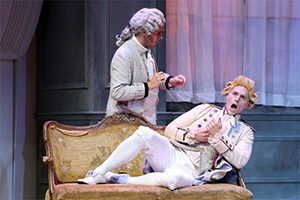Michael Halliwell
The 'anxiety of influence' is just as pertinent to music as it is to all the arts. Scholars have claimed that Mozart was strongly influenced in the composition of Le nozze di Figaro (1786), by André Grétry's (1741–1813) L'Amant jaloux (The Jealous Lover, or False Appearances) (1778). The musical and dramatic genius of ...
... (read more)Michael Halliwell reviews 'Charles Mackerras' edited by Nigel Simeone and John Tyrrell
Ask any opera singer from the last fifty or more years who their favourite conductor is, and a substantial number would plumb for Charles Mackerras if they had enjoyed the privilege of working with him. There were always more flamboyant conductors – Karajan, Bernstein, Abbado, and others spring to mind – and certainly many enjoyed more immediate name recognition ...
Audra McDonald sings Broadway (Sydney Symphony Orchestra)
In 2012 Stephen Sondheim reacted rather unexpectedly to a new production entitled 'The Gershwins' Porgy and Bess'. The original show, which itself has undergone multiple transformations since its première in 1935, was somewhat rewritten, incorporating new scenes, additional dialogue, revised orchestrations, the insertion of new biographical details, as wel ...
Michael Halliwell reviews 'The Rabbits' (Opera Australia/Barking Gecko Theatre Company)
Australia is being overrun by a rabbit phenomenon, but not of the annoying, four-legged variety. It’s The Rabbits: the opera, the musical, the song cycle, or what? Does it matter?
Premièred to highly positive reviews at the Perth Festival in February this year, it has now reached the Melbourne Festival. Some have seen in the success of this wo ...
British director, Nicholas Hytner, remarking on its indestructibility, once observed that one could set The Marriage of Figaro on the moon as long as the doors were in the right place. In fact, not such a strange idea, as Mozart’s great contemporary, Joseph Haydn, had set his opera Il mondo della luna (‘The World on the Moon’) exactly there.
...Michael Halliwell reviews 'The Oxford Handbook of Opera' edited by Helen M. Greenwald
Orpheus – composer and singer of his own song – is regarded as the founding figure of opera. One of the most arresting images of Orpheus is of his death – his dismembered head on his lyre floating down a river, still singing. Opera’s history is dogged by its own death wish; the art form has been pronounced dying, or even dead almost from its inception, yet z ...



